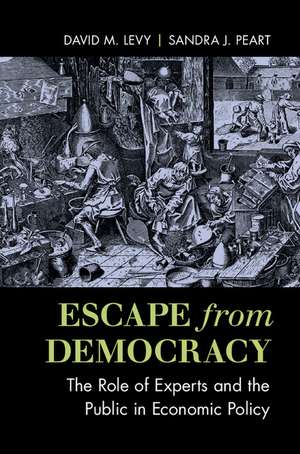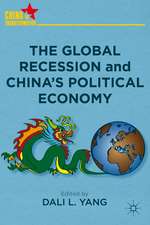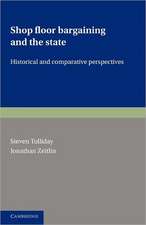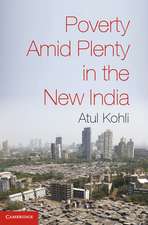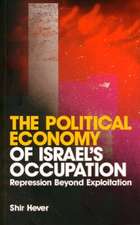Escape from Democracy: The Role of Experts and the Public in Economic Policy
Autor David M. Levy, Sandra J. Pearten Limba Engleză Hardback – 23 dec 2016
Preț: 797.37 lei
Preț vechi: 927.17 lei
-14% Nou
Puncte Express: 1196
Preț estimativ în valută:
152.58€ • 159.71$ • 126.99£
152.58€ • 159.71$ • 126.99£
Carte tipărită la comandă
Livrare economică 31 martie-14 aprilie
Preluare comenzi: 021 569.72.76
Specificații
ISBN-13: 9781107142398
ISBN-10: 1107142393
Pagini: 290
Ilustrații: 15 b/w illus. 17 colour illus. 13 tables
Dimensiuni: 154 x 239 x 18 mm
Greutate: 0.59 kg
Editura: Cambridge University Press
Colecția Cambridge University Press
Locul publicării:New York, United States
ISBN-10: 1107142393
Pagini: 290
Ilustrații: 15 b/w illus. 17 colour illus. 13 tables
Dimensiuni: 154 x 239 x 18 mm
Greutate: 0.59 kg
Editura: Cambridge University Press
Colecția Cambridge University Press
Locul publicării:New York, United States
Cuprins
Acknowledgments; Part I. Introductory Themes: 1. Introduction; Part II. The Discussion Tradition: 2. On 'strongly fortified minds': self-restraint and cooperation in the discussion tradition; 3. The Knightian moment; 4. The rise of new welfare economics: an end to endogenous goals?; Part III. When Linear Models Fail: Two Cases: 5. Experts and eugenics: 'science' privileges a social goal; 6. Expert judgment and Soviet growth; Part IV. An End to Discussion: Secrecy and the Temptation to Bias: 7. Experts and the philosopher's stone: John Law's secret financial alchemy; 8. The consequence of suppressing discussion: imprudence with biased experts; Part V. Getting the Best out of Experts: 9. A revised code of ethics for experts; 10. Mitigating the consequences of factional expertise; 11. Inducing greater transparency; Part VI. Conclusion: 12. Vox populi?
Recenzii
'You might think that an age of anticipated global warming is the wrong time to question the popular habit of deference to experts. David M. Levy and Sandra J. Peart argue otherwise in Escape from Democracy, contending that democratic discussion, not hierarchical domination, is the mode appropriate to the public sphere. They trace the eclipse of the democratic tradition in university economics. They illustrate the dangers of runaway authority with two disturbing cases: the eugenics movement, and comparative economics during the Cold War. This is a wise and high-spirited book by two of economics' foremost public intellectuals.' David Warsh, Proprietor of the weekly commentary Economic Principals
'Levy and Peart demonstrate brilliantly the dangers of deferring to experts. When we treat politics like engineering or dentistry we ask the experts to choose for us. This technocratic error is the escape from democracy the authors warn us against. If we are serious about equality, we must be serious about democracy. Theirs is a message - and an analysis - that we, the people, urgently need to hear.' Roger Koppl, Syracuse University
'Levy and Peart are impressively knowledgeable in the primary and secondary classics of history of economics, not to mention statistics, game theory and archival research. They get excited by the subject and have produced an engrossing and relevant volume. As these notes may suggest, their book encourages discussion, even debate.' Joseph Persky, EH.Net
'This is a fascinating and important book … we have here the beginning of a much-needed and long-overdue conversation.' Charles R. McCann, History of Economic Ideas
'Levy and Peart demonstrate brilliantly the dangers of deferring to experts. When we treat politics like engineering or dentistry we ask the experts to choose for us. This technocratic error is the escape from democracy the authors warn us against. If we are serious about equality, we must be serious about democracy. Theirs is a message - and an analysis - that we, the people, urgently need to hear.' Roger Koppl, Syracuse University
'Levy and Peart are impressively knowledgeable in the primary and secondary classics of history of economics, not to mention statistics, game theory and archival research. They get excited by the subject and have produced an engrossing and relevant volume. As these notes may suggest, their book encourages discussion, even debate.' Joseph Persky, EH.Net
'This is a fascinating and important book … we have here the beginning of a much-needed and long-overdue conversation.' Charles R. McCann, History of Economic Ideas
Notă biografică
Descriere
This text interrogates the role of experts in governing and proposes a viable alternative: governing by democratic discussion.
